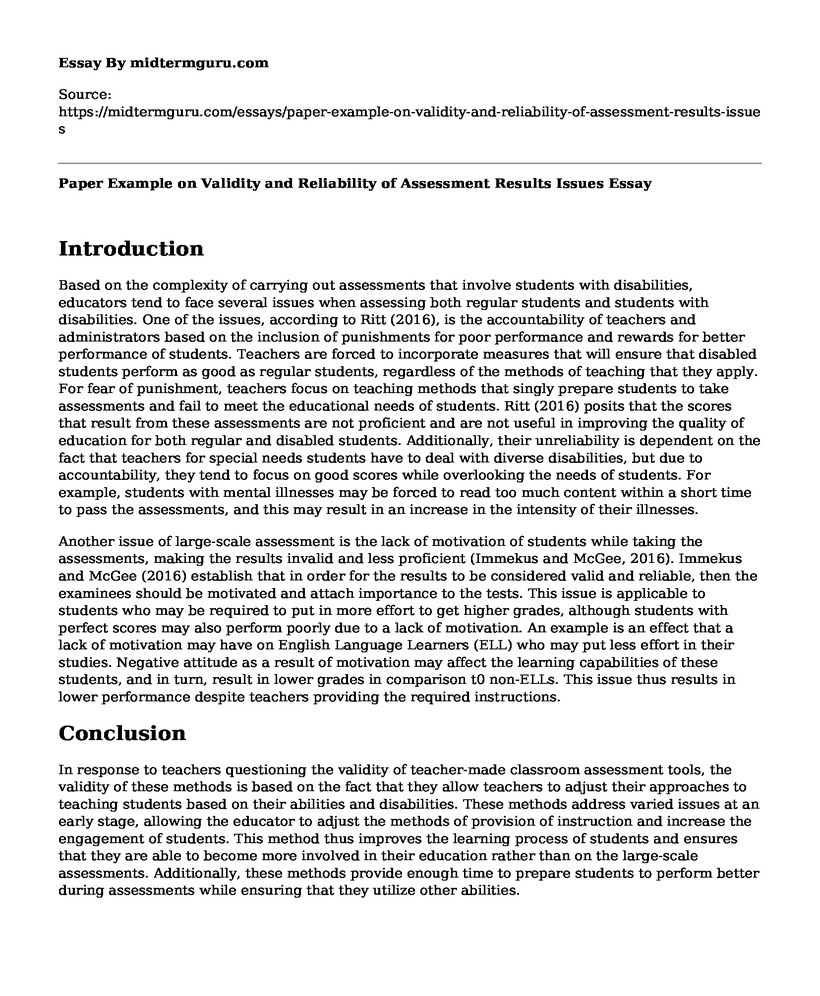Introduction
Based on the complexity of carrying out assessments that involve students with disabilities, educators tend to face several issues when assessing both regular students and students with disabilities. One of the issues, according to Ritt (2016), is the accountability of teachers and administrators based on the inclusion of punishments for poor performance and rewards for better performance of students. Teachers are forced to incorporate measures that will ensure that disabled students perform as good as regular students, regardless of the methods of teaching that they apply. For fear of punishment, teachers focus on teaching methods that singly prepare students to take assessments and fail to meet the educational needs of students. Ritt (2016) posits that the scores that result from these assessments are not proficient and are not useful in improving the quality of education for both regular and disabled students. Additionally, their unreliability is dependent on the fact that teachers for special needs students have to deal with diverse disabilities, but due to accountability, they tend to focus on good scores while overlooking the needs of students. For example, students with mental illnesses may be forced to read too much content within a short time to pass the assessments, and this may result in an increase in the intensity of their illnesses.
Another issue of large-scale assessment is the lack of motivation of students while taking the assessments, making the results invalid and less proficient (Immekus and McGee, 2016). Immekus and McGee (2016) establish that in order for the results to be considered valid and reliable, then the examinees should be motivated and attach importance to the tests. This issue is applicable to students who may be required to put in more effort to get higher grades, although students with perfect scores may also perform poorly due to a lack of motivation. An example is an effect that a lack of motivation may have on English Language Learners (ELL) who may put less effort in their studies. Negative attitude as a result of motivation may affect the learning capabilities of these students, and in turn, result in lower grades in comparison t0 non-ELLs. This issue thus results in lower performance despite teachers providing the required instructions.
Conclusion
In response to teachers questioning the validity of teacher-made classroom assessment tools, the validity of these methods is based on the fact that they allow teachers to adjust their approaches to teaching students based on their abilities and disabilities. These methods address varied issues at an early stage, allowing the educator to adjust the methods of provision of instruction and increase the engagement of students. This method thus improves the learning process of students and ensures that they are able to become more involved in their education rather than on the large-scale assessments. Additionally, these methods provide enough time to prepare students to perform better during assessments while ensuring that they utilize other abilities.
References
Immekus, J. C. and McGee, D. (2016). The Measurement Invariance of Student Opinion Scale across English and Non-English Language Learner Students within the Context of Low- and High-Stakes Assessments. Frontiers in Psychology, vol. 7, Iss. 1352, pp, 4-13.
Ritt, M. (2016). The Impact of High-Stakes Testing on the Learning Environment. Social Work Clinical Research Paper, pp.2-55.
Cite this page
Paper Example on Validity and Reliability of Assessment Results Issues. (2022, Aug 31). Retrieved from https://midtermguru.com/essays/paper-example-on-validity-and-reliability-of-assessment-results-issues
If you are the original author of this essay and no longer wish to have it published on the midtermguru.com website, please click below to request its removal:
- Essay on Online Learning vs Traditional Learning
- Narrative Analysis Paper Example on the Article What Being the Child of Immigrants Is Like by Bedi
- Why Grandparents Are Raising Their Grandchildren? - Essay Sample
- Essay Sample on Social and Pragmatic Factors Influencing Thou and You
- Positive Reinforcement: Strengthening Behaviour With Desirable Stimulus - Research Paper
- Toy Shows as Pre-Adult Preparation: Roland Barthes' Insight - Essay Sample
- Single Parenting: A Challenging Yet Rewarding Journey - Essay Sample







